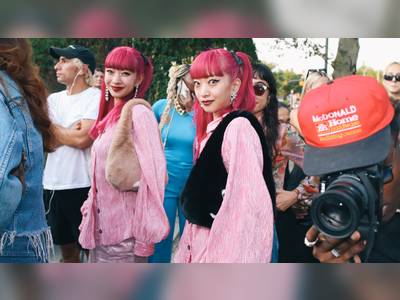BATAVIA, Ohio (AdAge.com) -- So much for the lipstick effect: The
theory that lipstick sales not only survive but thrive during an
economic downturn doesn't appear to be panning out this time around.
Estée Lauder Chairman Leonard Lauder is credited with identifying the
phenomenon in which sales of lipstick actually accelerate during a
downturn as women theoretically console themselves with small luxuries
during hard times. At least during the recessions of the early 1990s
and 2001-2002, it seemed to hold true.
Yet as the economy slowed and lower-income women in particular
were squeezed by gas prices and the housing crunch in the back half of
last year, cosmetic sales got hit hard, at least in mass channels
measured by Information Resources Inc. Among the weakest categories:
lip treatments.
Sore lips
Overall, cosmetic sales fell 2.2% to $790.4 million
last quarter, with sales of lipstick off 1.9% and overall lip
treatments down 10.9%, according to IRI data reported by Deutsche Bank.
Trends were worse for makeup overall in December, off 5% from a year
ago, with lip treatments continuing to drag down the whole category.
Even in prestige and specialty channels, lipstick appears to
be faring poorly as the economy slows and consumer distress rises. "It
seems that consumers aren't walking away from makeup, but that they're
buying it a little differently," said Karen Grant, beauty analyst with
NPD Group. "They are opting a little more for the staples such as
foundation and less [for] color, including lip and eye."
NPD is still analyzing December data, but the early read from
the rest of 2007 appears to argue against any lipstick effect. Therein
lies one of many puzzling factors about the cosmetics market of late,
which seems to be defying expectations on many fronts.
Mass retailers such as Wal-Mart, Target and drugstores have
been ascendant in most product categories, including the closely
related skin-care market, for several years. But it's been a different
story in makeup and color cosmetics, where department stores and
specialty retailers such as Sephora and Ulta have been gaining ground,
Ms. Grant said.
Specialty outlets
Makeup-artist brands, such as Estée
Lauder's Mac and Bobbi Brown, sold at prestige and specialty retailers
but not mass, as well as Bare Escentuals mineral products, launched in
prestige and specialty outlets, have played a major role here.
So, too, have the preferences of fast-growing ethnic groups,
particularly black and Asian women, for those brands and for buying in
department stores and specialty outlets, Ms. Grant said. "That may be a
function of [the prestige outlets] having color-matching capabilities,"
she said. "And the brands that are hottest for blacks, Hispanics and
Asians now are Mac and Bobbi Brown, even though their awareness of the
mass brands is higher."
She's still uncertain, however, whether a deepening economic
downturn will change the equation and lead more women back to somewhat
less expensive mass brands -- or perhaps to more lipstick.
One problem for lip treatments lately is that new-product
activity in mass cosmetics has focused more on face and eye makeup,
with relatively little on lipstick, said a marketer for one leading
mass brand.
Ascendant mass brands
Still, he's counting on a downturn to
lift sales of mass brands as some women trade down from prestige and
specialty shops for mass products he said perform as well or better.
And he doesn't believe industry rumors that big chains such as
Walgreens and CVS will reduce shelf space for cosmetics this year in
favor of faster-growing skin-care products.
Much of the malaise in mass cosmetics can be traced to a
single company: Revlon, said Deutsche Bank analyst Williams Schmitz,
which is still reeling from failed 2006 product launches and a
management shakeup last year.
But he said even without reductions in retail shelf space,
out-of-stocks could rise as mass retailers look to cut back on the
heavy inventory load of cosmetics.

Phil Oh’s Best Street Style Photos From the New York Fashion Week Spring 2023 Shows
This season New York Fashion Week has brought in a worldwide crowd of stars thanks to a packed season that even includes shows...












